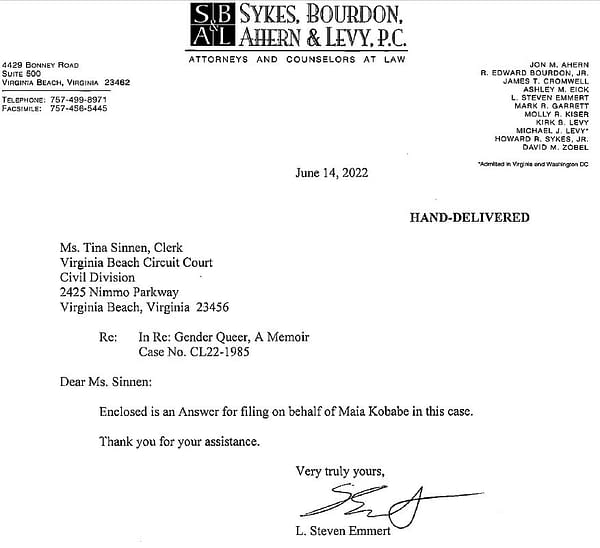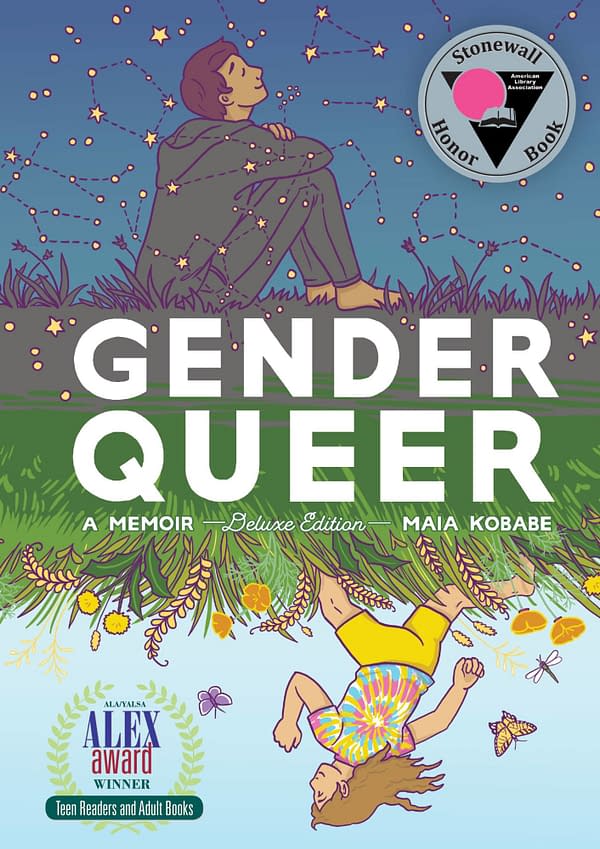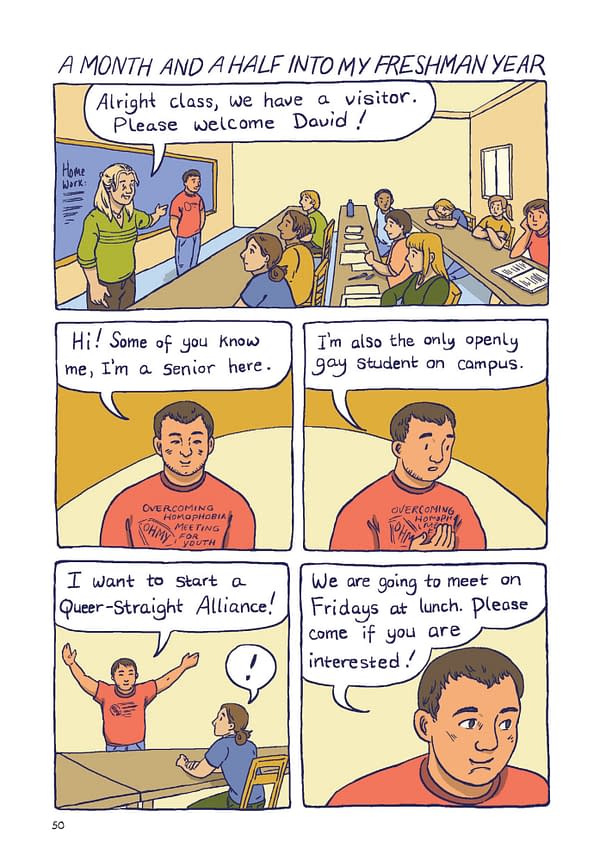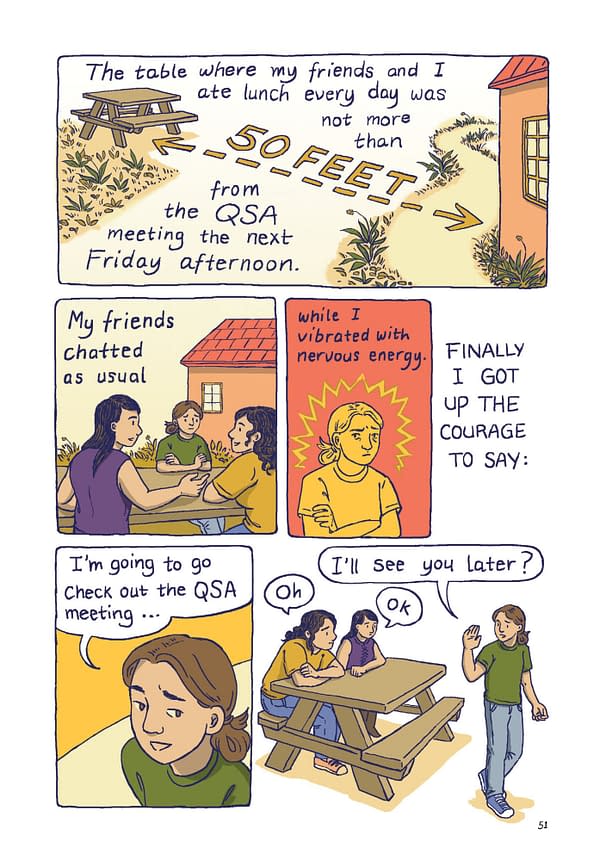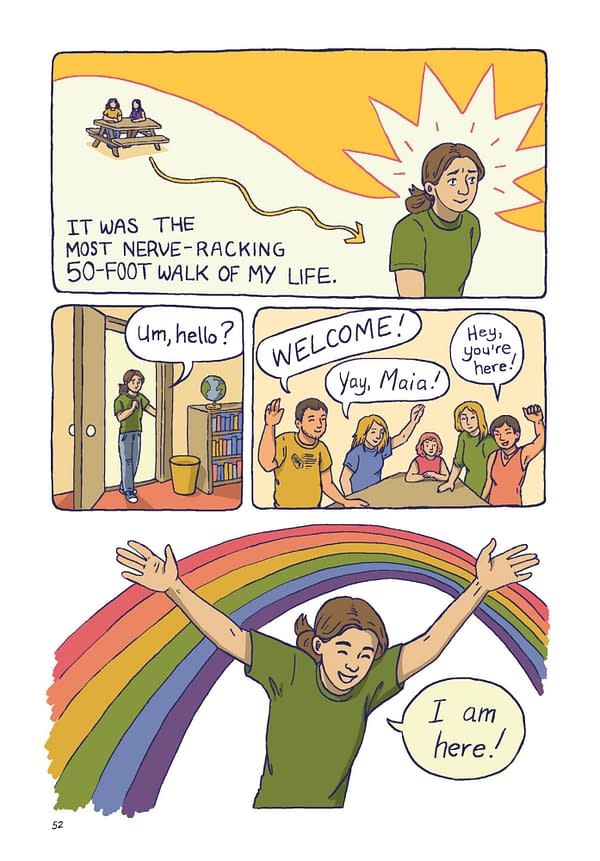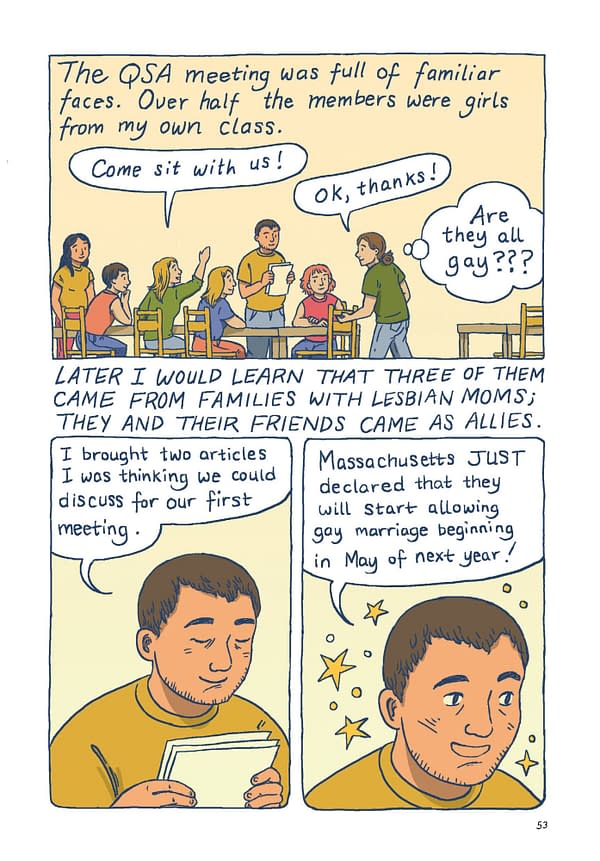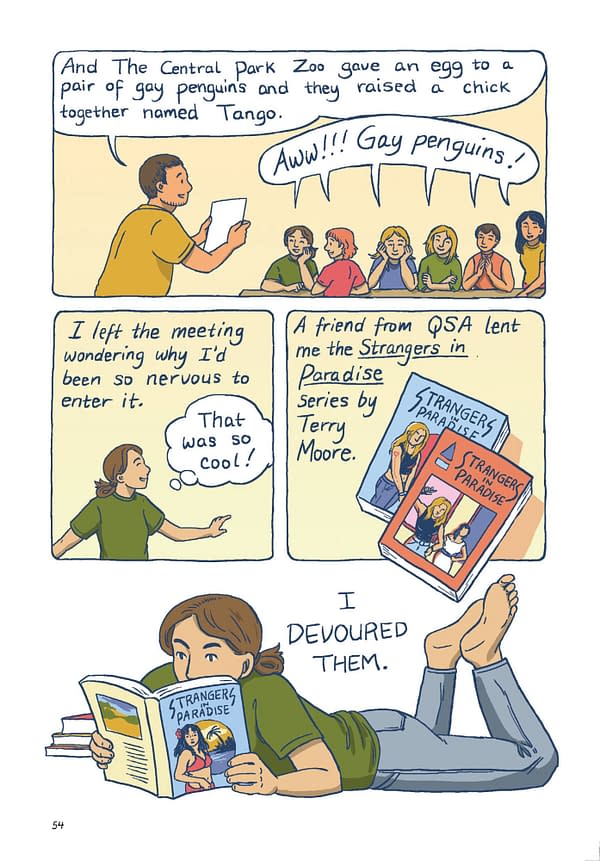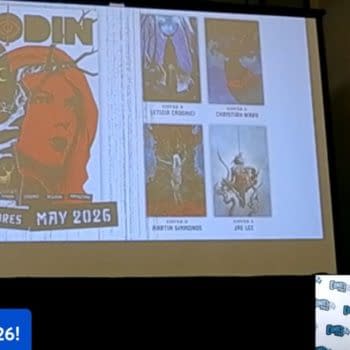Posted in: Comics, Oni Press | Tagged: gender queer, lawsuit, Maia Kobabe, Obscenity, oni press
Maia Kobabe's Legal Response To Gender Queer Obscenity Lawsuit
Maia Kobabe is named in the criminal lawsuit of obscenity brought against em and Oni Press over the graphic novel Gender Queer by Republican Virginian politicians as part of a political campaign that has previously proved successful. They didn't sue Phoebe Kobabe, in what may be one of the few examples of a colourist being glad they were ignored. But Maia Kobabe has now filed a legal response courtesy of Sykes, Bourdon, Ahern & Levy.
The response takes issue with a number of technical matters in the presentation of the case, noting that "the misapplication of Code §18.2-384 to the subject book, as the petitioner seeks here, would render the statute unconstitutional as applied" and that "The petition improperly attempts to graft a provision from Code §18.2-391 onto Code §18.2-384 by its claim that the book is 'obscene for distribution to minors.'"
More widely, Maia Kobabe's lawyers state "Taken as a whole, the subject book has serious literary, artistic, political, and scientific value; does not have as its dominant theme or purpose an appeal to the prurient interest of adults or juveniles; does not go substantially beyond customary limits of candor in description or representation of such matters for either adults or juveniles; and does not portray sexual conduct in a patently offensive way for adults or with respect to prevailing standards in the adult community with respect to what is suitable material for juveniles. As such, it cannot be proscribed or restricted as the petitioner seeks here."
Oni Press republished Gender Queer this past week in a new deluxe edition.
In 2014, Maia Kobabe, who uses e/em/eir pronouns, thought that a comic of reading statistics would be the last autobiographical comic e would ever write. At the time, it was the only thing e felt comfortable with strangers knowing about em. Then e created Gender Queer. Maia's intensely cathartic autobiography charts eir journey of self-identity, which includes the mortification and confusion of adolescent crushes, grappling with how to come out to family and society, bonding with friends over erotic gay fan fiction, and facing the trauma and fundamental violation of pap smears. Started as a way to explain to eir family what it means to be nonbinary and asexual, Gender Queer is more than a personal story: It is a useful and touching guide on gender identity-what it means and how to think about it-for advocates, friends, and humans everywhere. This special deluxe hardcover edition of Gender Queer features a brand-new cover, exclusive art and sketches, a foreword from ND Stevenson, Lumberjanes writer and creator of She-Ra and the Princesses of Power, and an afterword from Maia Kobabe.
Lawsuits filed last month in Virginian courts by lawyer Republican Virginia assembly delegate Tim Anderson on behalf of himself and Republican congressional candidate Tommy Altman who lost in the recent primary for Congress, citing an obscure state obscenity law.
Whenever he has reasonable cause to believe that any person is engaged in the sale or commercial distribution of any obscene book, any citizen or the attorney for the Commonwealth of any county or city, or city attorney, in which the sale or commercial distribution of such book occurs may institute a proceeding in the circuit court in said city or county for adjudication of the obscenity of the book.
The suits alleged that the graphic novel Gender Queer written by Maia Kobabe, drawn by Phoebe Kobabe and published by Lion Forge/Oni Press, as well as the novel A Court of Mist and Fury by Sarah J. Maas, are "obscene for unrestricted viewing by minors." The statute states that;
Upon the filing of a petition pursuant to this article, the court in term or in vacation shall forthwith examine the book alleged to be obscene. If the court find no probable cause to believe the book obscene, the judge thereof shall dismiss the petition; but if the court find probable cause to believe the book obscene, the judge thereof shall issue an order to show cause why the book should not be adjudicated obscene.
And this month, the retired Petersburg-area Judge Pamela Baskervill found there was "probable cause" for the obscenity claims, which allows the books' authors and publishers to defend the work within 21 days. The judgement would depend on the following;
1. The artistic, literary, medical, scientific, cultural and educational values, if any, of the book considered as a whole;
2. The degree of public acceptance of the book, or books of similar character, within the county or city in which the proceeding is brought;
3. The intent of the author and publisher of the book;
4. The reputation of the author and publisher;
5. The advertising, promotion, and other circumstances relating to the sale of the book;
6. The nature of classes of persons, including scholars, scientists, and physicians, for whom the book may not have prurient appeal, and who may be subject to exception pursuant to subsection G.
While lawyers have argued that the books do not come close to obscenity as set out above, those acting on behalf of the defendants and bookselling chain Barnes & Noble have responded stating that the suits as filed are defective and the remedy sought unconstitutional, cited by Publisher's Weekly.
"The petition and show cause order are facially defective because Virginia Code does not authorize a court to declare that the book is 'obscene for unrestricted viewing by minors'"
While Oni Press lawyers state that;
"The statute permits the challenge of a book on the grounds that it is 'obscene' to the entirety of the community of the Commonwealth. Petitioner here attempts to redefine Code §18.2-384 to have book declared obscene as it relates to one subset of the Community: minors in the Hampton Roads and Virginia Beach areas."
Gender Queer, a coming-of-age memoir by, and about, the author Maia Kobabe, has been repeatedly challenged in the USA, after being placed on a list of challenged books by Texan Republican state representative, Matt Krause, and has become a focal point of outrage. The Virginia Beach School Board recently decided to remove Gender Queer, after a review deemed the book "pervasively vulgar," against school and library staff recommendation.
The Comic Book Legal Defense Fund's current Interim Director Jeff Trexler has seen this weaponised, telling ICV2;
"I mentioned the parent in Virginia who went viral after talking about this. Then, that became the heart of the Youngkin campaign. One could say that the protest of Gender Queer became the hub or the foundation of a movement that ended up getting the Republican Governor of Virginia elected."
Oni Press is currently publishing a deluxe edition of Gender Queer. after its first publication in 2020. The following statement has been issued and is signed by the Comic Book Legal Defense Fund, the ACLU, the ACLU of Virginia, the American Booksellers for Free Expression, the American Library Association, the Association of American Publishers, the Authors Guild, Barnes & Noble Booksellers, the Freedom to Read Foundation, the National Coalition Against Censorship, the National Council of Teachers of English, PEN America, the Virginia Association of School Librarians, and the Virginia Library Association.
On May 18, 2022, in a legal action that threatens the free speech rights of all Virginians, a Virginia congressional candidate, represented by a Virginia delegate, sought and obtained an order finding probable cause, based on limited, one-sided evidence, that two well-received, well-reviewed books, Gender Queer and A Court of Mist and Fury, might be "obscene for unrestricted viewing by minors." Initiated under an obscure state law that allows any Virginia citizen to file a complaint against any book sold in the state, the order obtained by the Virginia delegate asks the authors and publishers of the books to present evidence that the books are not obscene so that the judge can make a final decision regarding whether the books may be legally sold in Virginia.
This legal action could profoundly limit the availability of books in the Commonwealth of Virginia. No book has been banned for obscenity in the United States in more than 50 years. Prohibiting the sale of books is a form of censorship that cannot be tolerated under the First Amendment.
The Supreme Court has established a narrow test for obscenity that requires that the text as a whole, even if it references sex or nudity, lack serious literary, artistic, political or scientific value. Neither of the books challenged in these cases comes remotely close to meeting the Supreme Court's long-established criterion for a finding of obscenity.
Gender Queer is a multi-award winning coming of age story that clearly has serious literary value. School review committees across the country composed of teachers, parents, students and librarians have upheld its value for adolescent readers, and it is available in many school and public libraries. Many of those committees have explicitly found that the book's few sexual references are not erotic, but instead are meant to inform the reader about the main character's struggles with eir identity and coming of age, struggles which are obviously of great interest and value to adolescents. In fact, school districts ranging from Maryland's Howard County to Kentucky's Jefferson County have put Gender Queer on "recommended" or "great" lists for high school students. It won the 2021 Iowa High School Battle of the Books. The School Library Journal called it "a great resource for those who identify as nonbinary or asexual as well as for those who know someone who identifies that way and wish to better understand." Contrary to well-settled United States Supreme Court precedent and Virginia law, suggestions that a few depictions of sexual experience render the entire, 240-page book obscene are, quite simply, false.
A Court of Mist and Fury is also a widely praised work with serious literary and artistic value. Booklist, School Library Journal, Publishers Weekly, Kirkus Reviews and USA Today gave it strongly positive reviews, calling it a worthy addition to its popular fantasy genre and praising it for its portrayals of mental health struggles, female empowerment, and the dynamics of romantic relationships. A bestselling novel that has appeared on the New York Times bestseller list 15 times, A Court of Mist and Fury was also chosen as a Goodreads Choice winner. Readers on Goodreads.com overwhelmingly rate it highly; out of more than 700,000 reviews, more than 90 per cent of the reviewers give it four or more stars.
Those who care about individual liberties and the freedom to read should understand precisely what the law requires, should the petitioners succeed: the law in question will make it illegal for any bookstore to sell these books in Virginia. This petition aims to prevent readers from making a personal choice to read these books at all. The petitioners' subsequent statements to the press make it clear that they intend to use this action as a means to criminally prosecute librarians, booksellers, and publishers.
Over the years, many people have tried to ban books by claiming that they are obscene. If persons like the petitioners obtain similar orders every time they have objections to a book, it will chill the freedom to read and stifle the voices of authors and publishers. Librarians, educators, authors, publishers, and booksellers will be targeted for making available books that everyone has the right to choose to read.
The undersigned organizations strongly urge Virginians–and all Americans–to stand against any attempt to use government action to dictate what we can read and how to think about what we read. Prohibiting the sale and distribution of books is an affront to our democratic values and threatens each person's and each family's individual liberties. It is contrary to our principles of democracy to allow anyone, regardless of their beliefs or political position, to determine what other Americans can read.
- Gender Queer: A Memoir Deluxe Edition Preview Image
- Gender Queer: A Memoir Deluxe Edition Preview Image
- Gender Queer: A Memoir Deluxe Edition Preview Image
- Gender Queer: A Memoir Deluxe Edition Preview Image
- Gender Queer: A Memoir Deluxe Edition Preview Image
- Gender Queer: A Memoir Deluxe Edition Preview Image


